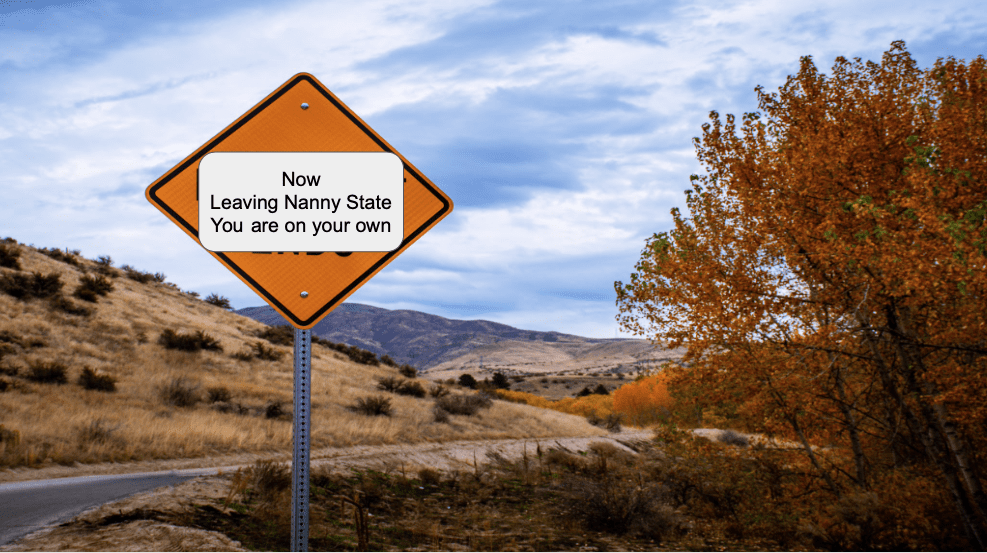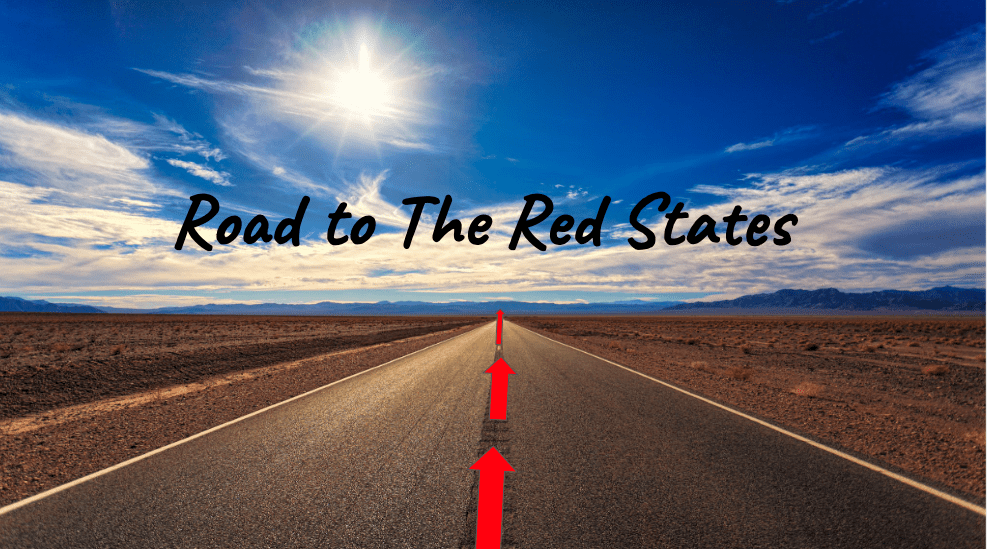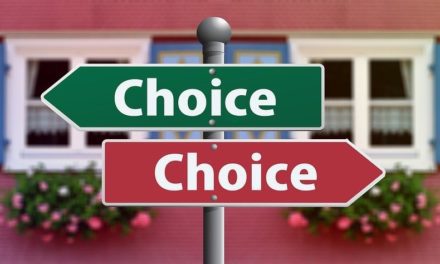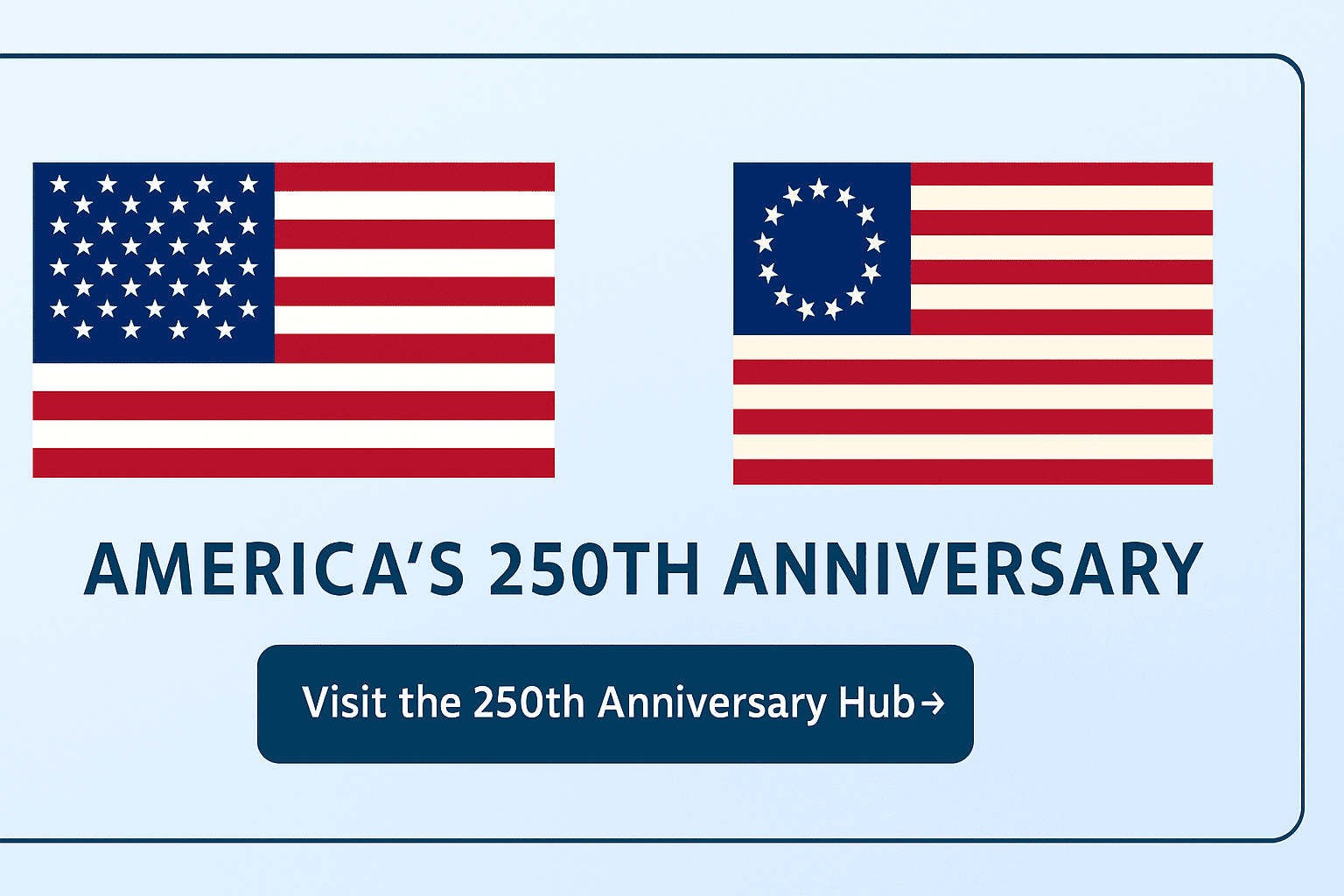Last updated on April 10th, 2023 at 06:15 pm
This post “touches” on what has become a serious area of discussion in the United States. Understanding that I risk offending someone by even discussing the items below, I never the less needed to say what I have said below. I now live in a Red area of a Red state and I find that my neighbors and I have much in common.
Where I moved from, there were many with whom I disagreed on items discussed below. While disagreement is healthy, I found that I generally lost the argument along the way e.g. elimination of plastic bags. When you believe your voice means nothing, it’s time to at least consider relocating.
Mobility in the U.S. has reduced significantly during the past few decades. According to the Pew Research Center in a study of people who moved homes in 2015/2016, only 11.2% moved. This is the lowest rate since the study started in 1948. There was a time when employers moved key people from one location to another and over the course of a career, a person may have moved many times.
Moving from metro New Jersey to small-town Alabama is a culture shock
This mobility allowed many people the opportunity to experience how others live. If you lived in metro New Jersey and moved to a small town in Alabama, you could experience culture shock. You quickly found that while we are all Americans, we are also different.
Most of the differences are in food, music, religion, weather, clothing, etc. Some people call a can of Pepsi “soda”, some call it “pop” and some call it a “soft drink”. There are perhaps other terms as well such as all soft drinks are referred to as “Coke”. I learned on my first trip to the South that what we called in California a “barbeque” was not a function but a product.
In the South, “barbeque” is food, that is grilled over a fire or smoked. In California, you “barbeque” which means to cook something on your “barbeque” device in the backyard, park, or other outdoor location.
Growing up in California, rock, and roll was the music that most people listened to. In the South it is generally Country, it’s Jazz in New Orleans and Memphis and bluegrass in other states. I found in rural Pennsylvania, people say “Yuns” meaning all of you. Elsewhere in the South, people say “y’all”. I have not been able to work out Cajun yet but that’s another story. If you visit some areas in New England you find that people speak just a bit differently than they do in Chicago.
Mobility has come to a halt
You get the picture, many of us traveled and experienced how others lived and raised their families. We learned to embrace the differences and even enjoy them. Mobility has come to a halt. According to another Pew Research Center study, upwards of 44% of Millennials in their late 20’s and early 30s live at home.
Baby boomers and Gen X’ers would take jobs in another state looking forward to the opportunity. There are many theories why Millennials do not move for job opportunities, it’s not important why this occurs for the purposes of this article just that it does.
With the age of the internet, many employers believe that leaving employees at their homes or existing places of business works as well because of communication systems such as Skype and others. The internet along with the significant cost of moving a family has contributed to the reduction in mobility. If you are a mid-career person without support from your employer to move, the risk is too high for many to simply quit a job.
If you must pay the entire cost to move your household goods, pets, and children to a new job in another city or state, you are taking on risk. It is possible that this inability to move is causing some to remain in jobs that they are no longer satisfied with. This is a topic for another article.
Without mobility, people don’t learn about life in other areas
Without mobility, people do not get a “flavor” of how others live. I believe that it has led to intolerance on the part of younger generations. We are being dragged kicking and screaming into a nation of Blues and Reds. Some millennials want to move into densely populated cities where they can socialize through the “café” culture.
A study conducted on U.S. Census data by Pete Saunders in January 2017, published in Forbes, concluded that the population of educated millennials has increased in most major cities. This has given way to the “coastal state” concept where cities such as Seattle, Portland, San Francisco, Los Angeles, Houston, New York City, and others have little interest or understanding of how the “fly over” states live.
The cultural isolation that populations in the large cities offer their largely younger residents is reassuring to them. This can contribute to a mono-political culture where the group thinks replaces what would have been a broader experience if their families or they moved to the suburbs or more rural areas and lived for a time.
These cities have become “Blue” and are often part of a larger “Blue State” collective. Younger people believe that there is “diversity” in cities. It depends on what you mean by diversity. If you mean that people are there from all over the globe, then yes. If you mean a real diversity of ideas then no.
9 Important Reasons Why People are Moving to the Red States
Red states, or states that traditionally vote Republican in presidential elections, have seen an influx of residents in recent years. The reasons for this trend are varied, but there are several key factors that have contributed to the population growth in red states. Here are 9 important reasons why people are moving to red states:
- Lower taxes: Many red states have lower taxes than blue states, making them more attractive to people looking to save money. For example, Texas has no state income tax, making it a popular destination for retirees and small business owners.
- Affordable housing: In addition to lower taxes, red states often have more affordable housing options than blue states. For example, the median home price in Texas is around $250,000, while the median home price in California is around $600,000.
- Job opportunities: Red states are often home to major industries such as oil and gas, manufacturing, and agriculture, which provide job opportunities for people looking to relocate. For example, Texas is home to major oil and gas companies, making it a popular destination for people in the energy industry.
- Pro-business environment: Many red states have a pro-business environment, making them more attractive to entrepreneurs and small business owners. For example, Texas has a reputation for being business-friendly, with a streamlined regulatory process and a low overall tax burden.
- Strong education system: Red states often have strong education systems, making them more attractive to families with school-aged children. For example, Texas has a high graduation rate and a large number of public and private universities.
- Lower cost of living: Red states often have a lower cost of living than blue states, making them more affordable for people on a budget. For example, Texas has a lower cost of living than California, making it a popular destination for retirees.
- Outdoor recreation: Red states are often home to natural beauty and outdoor recreation opportunities, making them more attractive to people looking to enjoy the great outdoors. For example, Texas has many state and national parks, including Big Bend National Park and Guadalupe Mountains National Park.
- Political climate: Many people are attracted to the conservative political climate of red states. For example, Texas is a solid red state and has a conservative governor, making it a popular destination for people who want to live in a state with a conservative political climate.
- Sense of community: Many red states have a strong sense of community, making them more attractive to people looking for a sense of belonging. For example, Texas is home to many small towns and rural areas where people can feel connected to their community. (see references below)

Young people moving to the City older people moving to the suburbs
Just as many young people have moved to the City, older individuals raising families or retiring are considering suburban life along beaches and in inland states. Cities are becoming more expensive to live in and many “flyover” states have become more affordable. Many communities in the heartland are traditional and have had little outside influence.
The many waves of immigration that have concentrated in Cities and their environs have not generally hit smaller Western, Mid-Western and Southern States. As a result, these communities have changed little during the past several decades. Of course, they have adopted the new creature comforts and I do not mean that they all have horse-pulled carts but it’s important to many in these communities that family and religion come before other things.
A good example is that the average person living in San Francisco is unlikely to be a hunter, own a gun, or even fish. City residents are not and I am generalizing from my experience, outdoors people. They cannot conceive of shooting a deer. They are surrounded by water and most have never pulled in a fish. You can understand that fish come in a box at the supermarket.

It seems everyone owns a boat
In Ocean Springs, MS, it seems that everyone and their cousin owns a boat. Talk to anyone at a restaurant or service station by starting the conversation with “what type of boat do you own?”. Many people in the area hunt or have hunted. You find people actually fix things around their homes. How many city dwellers actually need to fix the plumbing in their apartments?
If found something else to be interesting in Ocean Springs. People who do manual work e.g. plumbers, carpenters, and electricians are from the area. Many are part of family businesses that have been around for generations. People who work in restaurants and hotels are not usually immigrants. Locals do not seem to look down on service jobs they take them when offered.
It seems that most manual labor in Blue cities is done by recent immigrants because “Americans will not do the work”. We have heard this from the leader of the Democrats in the U.S. House. While I believe that the leader is reflecting her own experience (she is from San Francisco), it is true in her community. Had she lived in rural America she would have found that in the absence of low-wage immigrants, the locals do all of the work.
The lack of mobility is dividing us
Our country is more divided than ever. I believe it is in large part due to the lack of mobility therefore lack of understanding about how others live and what they believe are core values to them. If we do not see how others live how can we conceive that our own view of the world does not necessarily reflect reality?
Watch a BBC production from Victorian England. The rich people sent their older children on trips around Europe when they finished the equivalent of a high school education. The purpose was to see how others lived and became “more worldly”. It was to round out their education.
A colleague of mine has told me about the times when her parents would load the kids into the car and start off across the country so they could see other places. Every summer they would head South, North, or East from California. They stopped in the smallest communities each had a story to tell. One community may have had the largest ear of corn, another the highest hill with a tree, etc. She gained a wealth of knowledge about how others live and that has had an impact on her life. She and her husband are doing the same with their kids.
Social media has reduced travel
Most Americans do not hit the road in that way any longer. With email, Twitter, Facebook and so many other forms of non-personal communication we are gravitating to our own corners much as boxers do. It seems that the Blue and Red sides only come together in national emergencies such as 9-11 in New York. After the noise dies down, we retreat to our corners.
There have been several factors that have led us down this road. Lack of mobility, the concentration of immigrants into cities, massive immigration at a rate even greater than at the beginning of the 20th century, and gravitation away from the political center. Residents of many large cities have in part due to younger populations and immigration tended to be more liberal. Residents of smaller communities and rural areas are more conservative.
Democrats and Republicans in the time of John Kennedy were generally close to the center, just a bit right or left. Now the center is all but abandoned as our changing culture is almost requiring us to be either a Liberal or Conservative, not a Democrat or Republican.

The nanny state
So we are now Red or Blue. And the cultural experience in both areas is sometimes significant. California has banned plastic bags. Some in red states are seeing this as an infringement on personal choice. California’s solution is to make everyone pay for the actions of a few. These nanny state laws seem to be the right thing to do on the surface.
No one wants plastic bags in the ocean. Why does it take a law to “make” people do the right thing? Some red states believe that people have a personal responsibility to dispose of plastic bags properly and that it is up to the person with the bag to do the right thing. This is one example of a blue vs red culture.
Chicago has all but banned handguns. Their reason is that if handguns are banned crime will be reduced. In Houston, people can own handguns and obtain concealed carry permits. Without getting into a political discussion about which has the highest murder rate, this is a comparison of blue vs red culture.
The nanny city
New York City banned sugar soft drinks at restaurants in cups larger than 16 ounces (the ban was later overturned by the state Supreme Court). The reason for the ban according to the mayor was that it improved the health of residents. This is an example of a blue city making a decision for people rather than in the case of every red city/state leaving it up to the person to decide.
It seems that a defining difference between the culture of a blue area and a red area is a personal responsibility. There is a long list of personal restrictions in blue areas while in red areas there are fewer personal restrictions. In blue areas, the prevailing belief on the part of elected officials is that people will not do the right thing unless there is a law that makes them do it. In most red areas the belief is that while the government will point identify issues, the prevailing belief is that adults will make the correct decision on their own.
I use the term “area” because people moving to red states may be moving to a blue city in a red state. Of course the opposite is true, a person living in Atlanta for example (a blue city in a red state) who moves fifty miles away is literally moving from a blue “area” to a red state. It seems that in addition to the discussion of an entire state as red or blue, we must talk about Cities vs non-cities. Moving to red states is not enough for some who need to move to a red “area” as well.
Are you Blue or Red? You may find that while this is not something you contemplated 40 years ago, it is something you are confronted with now. Ask yourself this, do you want to live in an area where children in school recite the pledge of allegiance in class or one that forbids it because it may offend someone? Which school is in a Blue area and which is in a Red area?
References:
- https://www.texasmonthly.com/politics/why-people-are-moving-to-texas-in-droves/
- https://www.cnn.com/2021/03/25/politics/red-states-population-growth-blue-states/index.html
- https://www.businessinsider.com/why-people-are-moving-to-texas-2022-1
- https://www.census.gov/quickfacts/TX
- https://www.census.gov/quickfacts/CA
- https://www.texasparks.com/
- https://www.cnn.com/2021/03/25/politics/red-states-population-growth-blue-states/index.html
Lots of other articles to read about
Please spend a few minutes reading about some articles on our blog that relate to this topic such as Why I Decided to Retire in Ocean Springs, Mississippi and 2022 mid-term results will cause more conservatives to relocate. Sign up to receive notification of new articles on this or other topics. Thanks for stopping by. Be sure to leave comments.
Discover more from RetireCoast.com
Subscribe to get the latest posts sent to your email.









